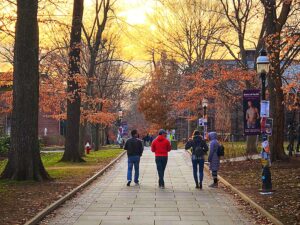Much like undergraduate schools have the Common App, medical schools have unified application portals. There is, however, a schism in the medical field between DO and MD programs, and the applications to these programs are similarly split. While MD programs uniformly use the AMCAS, DO programs can all be applied to using the American Association of Colleges of Osteopathic Medicine Application Service (AACOMAS).
In this article, we’ll break down the entire AACOMAS process step by step, letting you know what you’ll need for each portion of the application, and how best you can complete it. We’ll also give you strategy tips for approaching the AACOMAS. Let’s get started!
Creating an Account
The first, and most important thing to note is that you will only use AACOMAS if you are interested in attending a medical school which grants DO degrees. If you are interested in pursuing an MD instead, you will use the AMCAS. There is no overlap in the schools you can apply to with each application.
When you enter the AACOM website, you’ll see a button labeled start your application:
When you click on this, you will be taken to a new page where you will enter your demographic and contact information. You will need to confirm your email address to finish account creation. Once this is done, you can begin the application itself. This has four core sections:
- Personal Information
- Academic History
- Supporting Information
- Program Materials
We’ll go through each of these in turn.
The AACOMAS Personal Information Section
This section, as the name suggests, is a place for you to fill out your basic biographical information. You will also be asked about your race/ethnicity, your citizenship, and details about your parents, including their level of education.
You will also be asked about influences, where you can list family members who are physicians, and checkboxes for what influenced you to pursue osteopathic medicine specifically. If you select “Other” you will have 200 characters to describe any potential influences. Check all boxes that apply.
This section ends with “Other Information,” which contains questions about language proficiency, military service, criminal record, and academic infractions, along with income level. If you were dismissed from the military, committed an academic infraction, or have a criminal record you will complete a 500 word essay on the circumstances, and any repercussions the event had.
Finally, there is a section on the end for the impacts of Covid-19 on your journey to medical school. The first two questions are yes/no, and concern academic disruptions due to the pandemic. The third allows a 2500 character response on if and how the pandemic impacted your path to medical school.
The AACOMAS Academic History Section
This section asks about your academic history, record, and performance. This begins by listing the high schools and colleges you attended. This is straightforward, but make sure to be comprehensive.
After this you will need to enter all of your college coursework as it appears on your transcripts. This is incredibly time consuming, and tedious, but you have to do it carefully anyway. Mistakes are very difficult to fix once an application is submitted, so make sure all of your course information is entered correctly.
You need to include every course listed on your transcript, including any courses you withdrew from or ungraded courses. AACOMAS offers a transcript entry service which will do this work for you for an additional fee; between $77 and $150 depending on the number of transcripts required. You must submit your application (and pay the fee) before this service will be done, and you must review it for accuracy once it is completed.
All courses are entered by term; completed, in progress, and future coursework is all entered in the same way. You may need to abbreviate course names to fit into the allotted space. You need to select a subject for each course; though some will not fit neatly into a single subject. We advise referring to how your university classifies them. The application says, however, that if all else fails, you should give it your best guess.
All courses count as either science or non-science. These are used to calculate two different GPAs: science and total. Here is an alphabetical list of all possible course designations, as well as whether AACOMAS labels them as science (S), or non-science (N).
- Behavioral Science (N)
- Biochemistry (S)
- Biology/Zoology (S)
- English (N)
- Inorganic Chemistry (S)
- Mathematics (NS)
- Organic Chemistry (S)
- Other Non Science (N)
- Other Science (S)
- Physics (S)
If you are uncertain what counts as each category, AACOMAS provides examples on their website. Finally, you must designate whether or not each course was honors, advanced placement, study abroad, or repeated.
Standardized Tests
You will need to self report all standardized test scores through AACOMAS. This is generally only the MCAT, but includes the GRE if you are applying to DO/PhD programs. You must also include upcoming tests, inputting the date you will take it but omitting the score.
You will need to input your AAMC ID as well, so AACOMAS will be able to link your application with your official score report. Once this is done, you may go to AAMC’s website and release your official score report to AACOMAS. The turnaround time for this varies; details will be on the AAMC website.
Official Transcripts
On top of self reporting all of your coursework, you must also submit official transcripts from all of the schools you have attended. This includes college level coursework completed in high school (not AP classes, but dual credit or community college credit does count).
You should have all schools send official transcripts once you have created your account. Once transcripts are submitted, they cannot be updated. If you achieve a significant grade in a course after submitting a transcript, you can update schools using an update letter. Some schools separately ask for grade updates in their secondary application.
The AACOMAS Supporting Information Section
This section is for your letters of recommendation, experiences, achievements, and personal statement. We’ll go through each in order.
Letters of Recommendation
You create one entry per letter source, be it a packet, individual letter, or committee letter. You are able to create six entries total in AACOMAS. If you have more than six letters, you can send extras directly to schools. Do not send letters beyond school’s requirements however.
For committee letters specifically, enter the committee chair as the evaluator. Once evaluators are selected and email addresses inputted, AACOMAS will email evaluators directly for their letters. You should tell recommenders to be on the lookout for these when you request the letters; it is possible for these to end up in a spam folder.
Experiences
In this section, you can recount meaningful and medically related experiences you have had outside of the classroom. You can include any meaningful experiences you have had post high school, even if they were not directly related to medicine. You are allowed an unlimited number of examples in this section.
Each experience must be classified as one of the following:
- Extracurricular activities. These are school related clubs or teams which occur outside of the classroom. Paid employment doesn’t count.
- Non healthcare employment. This is any work you are paid to do which does not relate to the field of healthcare.
- Non healthcare volunteering or community enrichment. This is any volunteering work you do outside of the field of medicine.
- Healthcare experience. This covers both paid and unpaid work in the medical field, where you worked directly or indirectly with patients.
You then input information about the organization, your dates of involvement (which can end in the future if you are continuing your involvement during the application cycle), and a contact. This contact should ideally be a supervisor; if one is not available it should be someone who can speak to your role and involvement in the activity. While medical schools do not routinely reach out to contacts, they do on occasion if they have questions about your involvement.
Each experience then gives you 600 total characters to describe what you did in your own words. You should be brief, but give a full understanding of your actions and responsibilities within each activity.
Achievements
This section is similar to the experiences section, but serves instead to detail your accomplishments so far. Each of these must be categorized as one of the following:
- Awards. These are discrete things presented to you.
- Honors. Such as Dean’s list or graduating with high honors.
- Presentations. This is for research of various kinds.
- Publications. Again, referring to research.
- Scholarships. This refers primarily to competitive merit scholarships.
As with experiences, you get 600 total characters to describe each achievement, and may add unlimited examples. You should cover what the achievement was, selectivity, and any context needed so that admissions committees can understand what you accomplished in gaining it.
Personal Statement
This is where you enter the personal essay, which is sent out to every school you apply to. You have 5,300 total characters to explain your story, and why you want to attend medical school. For more information on how to approach writing your personal statement, see our article on medical school essays.
The AACOMAS Program Materials Section
This is the final section of the application, where you add schools you are applying to via the “Select Programs” tab. Once you add a school it will be added to your list on the right side of the screen. Clicking on it from there will show you whether the school has any additional requirements.
The requirements are specific to each school. Most ask for additional essays, which you will either fill out in the form or upload as a pdf. Some may ask about additional course requirements. Others have specific questions on any number of topics, either multiple choice or short response.
Submitting your Application
Once you go to submit the AACOMAS, you are prompted to agree to a number of statements on its accuracy and veracity. These agreements constitute a legal signature. You must complete these in order to submit, though you can submit before your transcripts and recommendation letters have been completed.
You should do a final review before you submit your entire application to check for typos or other errors; your ability to update it once it is submitted is limited. You can pay all of your application fees once it is submitted; these are non-refundable. Fee assistance is available for some applicants, you can learn who qualifies on their website.
You are able to add new coursework, recommenders and experiences once you have submitted your application, but cannot go back and edit existing experiences, achievements, or your personal statement. You may add new schools you are applying to at any time.
Final Thoughts
The AACOMAS is a long and involved application portal, much like its counterpart the AMCAS. That said, the centralized nature of the application makes it much easier to apply to multiple programs, and is very helpful for aspiring medical students. We hope this guide has told you all you need to know to successfully complete the AACOMAS, and shown you how to approach your medical school applications.
Of course, there’s more to applying to medical school than the application itself (though that is a key component). Your extracurriculars, letters of recommendation, and all you do in undergraduate school to prepare are all key for your chances of success. If you are looking for additional guidance, and want to hear how we can help you, schedule a free consultation today. We have a long experience advising students, and are always happy to hear from you.








